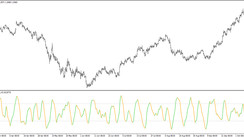Monetary policy and inflation data influence equity markets
On Monday, a slight drop was evident in the performance of the S&P 500, with investors holding their breath for the release of crucial inflation data, a factor that could significantly impact the Federal Reserve's long-standing decision on high yields.
The market was hopeful for a strong follow up to Friday’s rally as they turned their focus toward the Consumer Price Index's (CPI) release on Tuesday. Economists have projected an overall increase of 3.3% for October, falling slightly short of September’s 3.7%. However, the expectations for the core prices are believed to remain unchanged in comparison with the previous month.
Investor Confidence in Federal Reserve's Monetary Policy
Matt Stucky, a senior equity portfolio executive at Northwestern Mutual Wealth Management Company, suggests that the most significant influencers of financial market decision-making are CPI data and job market stats, as these factors directly affect future policies of the Federal Reserve.
Stucky states, "The market is of the belief that the Federal Reserve is set to step down its rate hike program. For this perception to be confirmed, we would need to see consistent improvement in the inflation landscape, and a dwindling job market."
As per the FedWatch tool by the CME Group, market traders approximately 86 percent assured that the Fed will hold the interest rates steady this December.
Economic Factors Impacting Investor Sentiment
As a bout of anxiety among investors arose from uncertainties circling the CPI data released on Monday, market strategist Michael O’Rourke from JonesTrading indicates that the downgrade of the US credit outlook from "negative" to "stable" by Moody's, also contributed to the mood. The potential threat of a shutdown looming over the US government post weekend deadline has subsequently intensified overall investor apprehension.
Performance of Major US Stock Indexes
On a slightly brighter note, despite the short dip in the S&P 500 by 0.08% or 3.69 points to 4,411.55, and a 0.22% or 30.37 points decrease in the Nasdaq Composite to 13,767.74, the Dow Jones Industrial Average rose by 54.77 points or 0.16%, touching 34,337.87.
The leading US stock indexes are experiencing a bounce back with the earnings season surpassing initial predictions and the confidence that US interest rates have reached their pinnacle. Energy proved to be the top performer among the S&P 500's 11 key sectors, surging by 0.7%. In contrast, utilities had the most substantial dip, falling by 1.2%.
The S&P healthcare index scored second highest in terms of percentage gain, with a 0.6% bump. Davita Inc, a dialysis service provider, recorded the highest percentage increase with a 6.5% jump.
Despite Tesla's stock closing with a more than 4% rise, significant stocks like Apple and Microsoft saw a dip, which placed pressure on the S&P 500 tech index.





